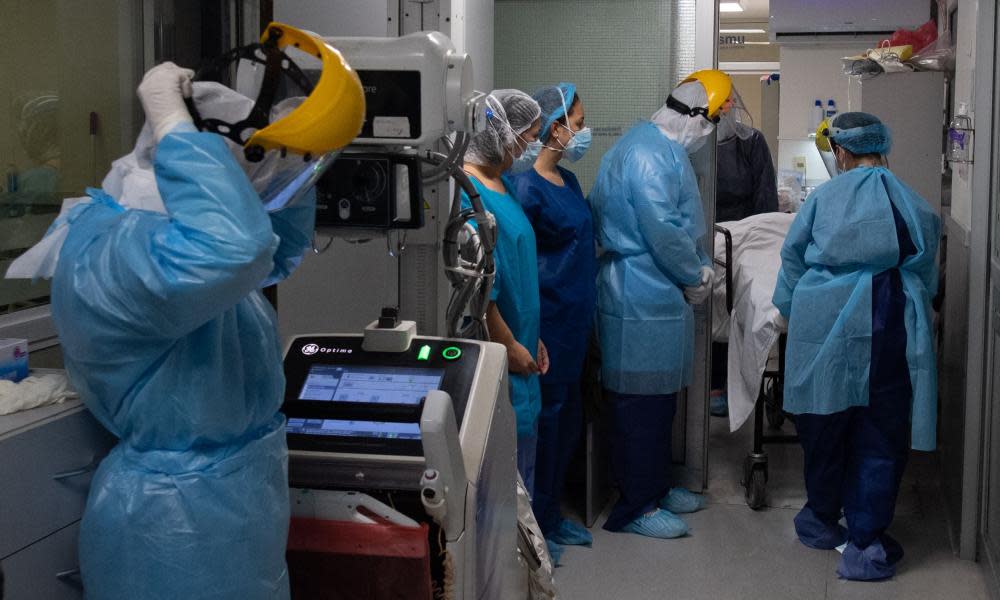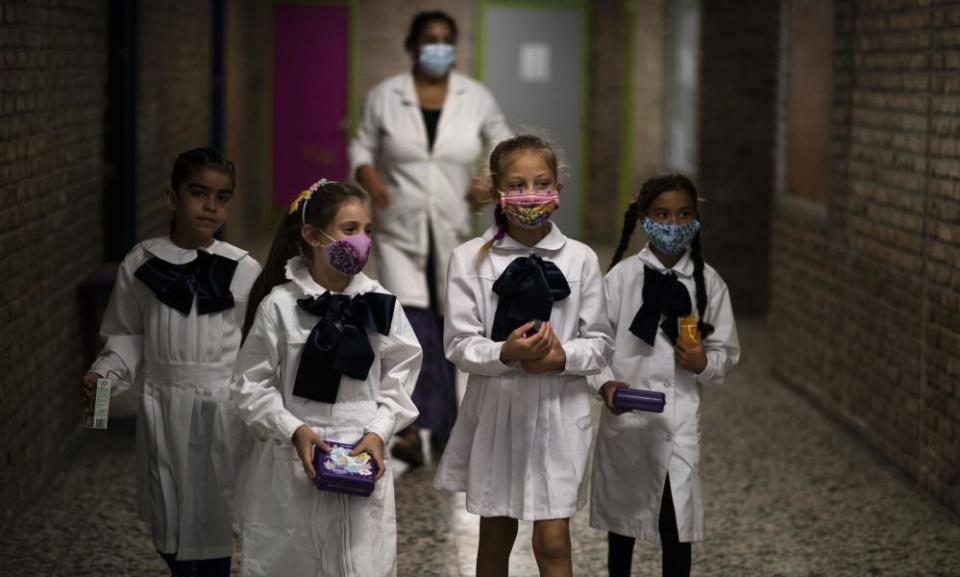Uruguay accused of squandering early Covid success amid deadly surge

- Oops!Something went wrong.Please try again later.
Enrique Soto, a senior cardiologist in Uruguay knew that, at the age of 65, he was at higher risk of Covid-19. His 40-year-old son Marcos had warned him as much but Soto replied he could not abandon his patients.
When Soto died at the beginning of Uruguay’s devastating recent second wave of infections his death became emblematic of the disaster that has unfolded in recent months in the small South American country.
Uruguay was once hailed for its model response to the pandemic, but its recent policies have delivered one of the world’s worst infection rates, with its government single-minded in avoiding new restrictions.
All of which has left the nation of 3.5 million – which last June was toying with the idea of declaring itself Covid-19-free – asking how things went so wrong – and offering grim lessons for other countries.
According to experts, the situation is the fruit of a decision by the government of Luis Lacalle Pou to abandon a successful policy of social restrictions in favour of a much more permissive regime that has instead relied almost exclusively on vaccination.
The result has been an outbreak that saw the country record cases of almost one in every 100 citizens, and a death rate of 50 a day – and continues at high levels.
That has represented the world’s fifth-highest death rate, with 20.64 per 100,000 people over two weeks – as well as the highest in Latin America.
Related: 'The heart of darkness': neighbors shun Brazil over Covid response
The cause, say experts, has been a combination of factors, from overconfidence to recent political missteps around vaccination, as well as the country’s proximity to Brazil, which has seen the development of a more contagious variant.
What has been striking for many has been the contrast in the response by the centre-right government during the early parts of the pandemic and during the disastrous recent wave.
Last March, after the first case of coronavirus was detected, the newly elected president announced the closure of some borders.
Lacalle Pou also cancelled public events, shuttered the education system, closed bars, malls and professional sports matches and prohibited collective worship. Uruguayans were asked to stay at home, and a test-and-trace system initiated.
By June Uruguay was marking several days in a row without infections.
During the most recent wave, however, the president has rejected calls for a national lockdown, making veiled allusions to the “police state” in a country in which the military dictatorship ended only in 1985.
Instead Lacalle Pou, like some Republicans in the US and British Conservative politicians, has insisted on the importance of “responsible freedom” – insisting that a strategy of vaccination, which began only in March, would be enough, while rejecting calls by the country’s scientific advisory group for the reintroduction of social distancing requirements.
All of which has baffled many of the country’s health professionals who have been working on the frontline. After his shift at a Montevideo hospital, intensive care doctor Gustavo Grecco summarized the problem: “The government stopped listening to science, to its scientific advisory group, to its doctors, to the universities. Since February the government has been entirely divorced from the recommendations of the scientific community.”

That analysis, however, is rejected by the health minister, Daniel Salinas, who insisted that rather than look at the horrific figures from the recent outbreak observers should focus on Uruguay’s experience throughout the pandemic.
“When people worry about the mortality rate in Uruguay,” he told the Guardian, “they should look at the whole picture and not just a fragment of it, which says we’re the worst in the world for 14 days.”
While Salinas insists that the vaccination campaign has been going well, with 60% having received one dose, other observers note that the country’s ambition to fully vaccinate 80% will not be achievable before October at the earliest.
“We have 43% people vaccinated with two doses,” says Dr Alvaro Niggemeyer, who works at an intensive care unit in Montevideo with Covid-19 patients.
“That’s about 1,490,000 people out of 3.6 million at a time we have the P1 strain circulating that is widely contagious.
“We have borders through which the Delta strain can also sneak in and we are behaving as if the problem is already solved because we are already vaccinating.
“My message is we have 2,100,000 unimmunised Uruguayans. We have high viral circulation and we have a circulating strain that has higher mortality in young people.”
Inevitably, perhaps, Lacalle Pou’s handling of the crisis has drawn criticism from political rivals.
“The president told us in a meeting that he did not believe in reducing social mobility. He said that he did not believe that these measures would be respected,” said Senator Mario Bergara, a member of the leftwing Frente Amplio party and a former minister of finance.
“That’s despite the fact that according to the scientific community three weeks of significant restrictions would have led to a major reduction in infections and deaths – all of which leads us to say that there are preventable deaths in Uruguay today.”
Related: A silent decimation: South America’s losing battle against Covid
Among those who appear to have lost confidence in the government’s approach are members of the GACH, a scientific advisory group which says the country’s president increasingly ignored their advice – prompting the group to be wound up.
“The proportion of our recommendations that government takes into account has changed [since early in the pandemic],” said Arturo Briva, a professor of critical care medicine and a member of the group.
“We have to assume that the government is taking into account other issues when making its decisions, but I’m telling you the painful truth that looking at the clinical results I believe that we can have better results with decreased mobility.”
For Enrique Soto’s son Marcos, an academic, the government’s rejection of scientific and medical advice is doubly painful following his father’s death.
‘In my own professional life I trust and defer to those with specialist knowledge in decision-making. It’s hard to believe that there is nothing more that we can do to avoid more deaths. Are we sure that we have done everything? These are the questions that need to be asked.”

